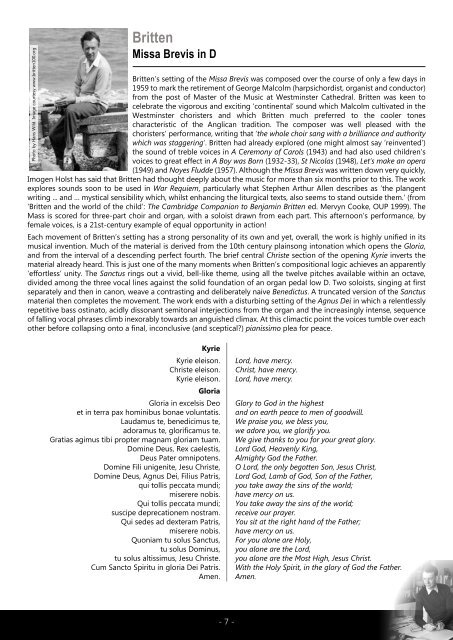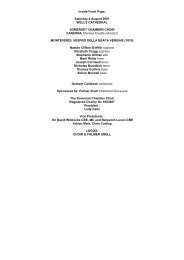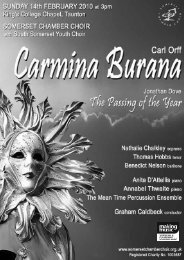Click here to view the concert programme - Somerset Chamber Choir
Click here to view the concert programme - Somerset Chamber Choir
Click here to view the concert programme - Somerset Chamber Choir
You also want an ePaper? Increase the reach of your titles
YUMPU automatically turns print PDFs into web optimized ePapers that Google loves.
Pho<strong>to</strong> by Hans Wild. Image courtesy www.britten100.orgBrittenMissa Brevis in DBritten’s setting of <strong>the</strong> Missa Brevis was composed over <strong>the</strong> course of only a few days in1959 <strong>to</strong> mark <strong>the</strong> retirement of George Malcolm (harpsichordist, organist and conduc<strong>to</strong>r)from <strong>the</strong> post of Master of <strong>the</strong> Music at Westminster Ca<strong>the</strong>dral. Britten was keen <strong>to</strong>celebrate <strong>the</strong> vigorous and exciting ‘continental’ sound which Malcolm cultivated in <strong>the</strong>Westminster choristers and which Britten much preferred <strong>to</strong> <strong>the</strong> cooler <strong>to</strong>nescharacteristic of <strong>the</strong> Anglican tradition. The composer was well pleased with <strong>the</strong>choristers’ performance, writing that ‘<strong>the</strong> whole choir sang with a brilliance and authoritywhich was staggering’. Britten had already explored (one might almost say ‘reinvented’)<strong>the</strong> sound of treble voices in A Ceremony of Carols (1943) and had also used children’svoices <strong>to</strong> great effect in A Boy was Born (1932-33), St Nicolas (1948), Let’s make an opera(1949) and Noyes Fludde (1957). Although <strong>the</strong> Missa Brevis was written down very quickly,Imogen Holst has said that Britten had thought deeply about <strong>the</strong> music for more than six months prior <strong>to</strong> this. The workexplores sounds soon <strong>to</strong> be used in War Requiem, particularly what Stephen Arthur Allen describes as ‘<strong>the</strong> plangentwriting ... and … mystical sensibility which, whilst enhancing <strong>the</strong> liturgical texts, also seems <strong>to</strong> stand outside <strong>the</strong>m.’ (from‘Britten and <strong>the</strong> world of <strong>the</strong> child’: The Cambridge Companion <strong>to</strong> Benjamin Britten ed. Mervyn Cooke, OUP 1999). TheMass is scored for three-part choir and organ, with a soloist drawn from each part. This afternoon’s performance, byfemale voices, is a 21st-century example of equal opportunity in action!Each movement of Britten’s setting has a strong personality of its own and yet, overall, <strong>the</strong> work is highly unified in itsmusical invention. Much of <strong>the</strong> material is derived from <strong>the</strong> 10th century plainsong in<strong>to</strong>nation which opens <strong>the</strong> Gloria,and from <strong>the</strong> interval of a descending perfect fourth. The brief central Christe section of <strong>the</strong> opening Kyrie inverts <strong>the</strong>material already heard. This is just one of <strong>the</strong> many moments when Britten’s compositional logic achieves an apparently‘effortless’ unity. The Sanctus rings out a vivid, bell-like <strong>the</strong>me, using all <strong>the</strong> twelve pitches available within an octave,divided among <strong>the</strong> three vocal lines against <strong>the</strong> solid foundation of an organ pedal low D. Two soloists, singing at firstseparately and <strong>the</strong>n in canon, weave a contrasting and deliberately naive Benedictus. A truncated version of <strong>the</strong> Sanctusmaterial <strong>the</strong>n completes <strong>the</strong> movement. The work ends with a disturbing setting of <strong>the</strong> Agnus Dei in which a relentlesslyrepetitive bass ostina<strong>to</strong>, acidly dissonant semi<strong>to</strong>nal interjections from <strong>the</strong> organ and <strong>the</strong> increasingly intense, sequenceof falling vocal phrases climb inexorably <strong>to</strong>wards an anguished climax. At this climactic point <strong>the</strong> voices tumble over eacho<strong>the</strong>r before collapsing on<strong>to</strong> a final, inconclusive (and sceptical?) pianissimo plea for peace.KyrieKyrie eleison.Christe eleison.Kyrie eleison.GloriaGloria in excelsis Deoet in terra pax hominibus bonae voluntatis.Laudamus te, benedicimus te,adoramus te, glorificamus te.Gratias agimus tibi propter magnam gloriam tuam.Domine Deus, Rex caelestis,Deus Pater omnipotens.Domine Fili unigenite, Jesu Christe,Domine Deus, Agnus Dei, Filius Patris,qui <strong>to</strong>llis peccata mundi;miserere nobis.Qui <strong>to</strong>llis peccata mundi;suscipe deprecationem nostram.Qui sedes ad dexteram Patris,miserere nobis.Quoniam tu solus Sanctus,tu solus Dominus,tu solus altissimus, Jesu Christe.Cum Sanc<strong>to</strong> Spiritu in gloria Dei Patris.Amen.Lord, have mercy.Christ, have mercy.Lord, have mercy.Glory <strong>to</strong> God in <strong>the</strong> highestand on earth peace <strong>to</strong> men of goodwill.We praise you, we bless you,we adore you, we glorify you.We give thanks <strong>to</strong> you for your great glory.Lord God, Heavenly King,Almighty God <strong>the</strong> Fa<strong>the</strong>r.O Lord, <strong>the</strong> only begotten Son, Jesus Christ,Lord God, Lamb of God, Son of <strong>the</strong> Fa<strong>the</strong>r,you take away <strong>the</strong> sins of <strong>the</strong> world;have mercy on us.You take away <strong>the</strong> sins of <strong>the</strong> world;receive our prayer.You sit at <strong>the</strong> right hand of <strong>the</strong> Fa<strong>the</strong>r;have mercy on us.For you alone are Holy,you alone are <strong>the</strong> Lord,you alone are <strong>the</strong> Most High, Jesus Christ.With <strong>the</strong> Holy Spirit, in <strong>the</strong> glory of God <strong>the</strong> Fa<strong>the</strong>r.Amen.- 7 -












